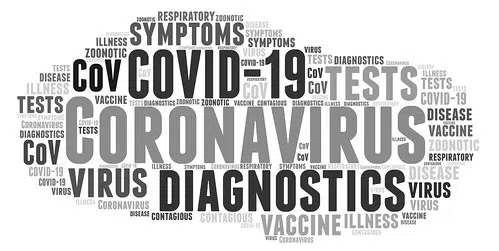With End of Public Health Emergencies May 11, Data Reporting has Shifted
 CHICAGO, IL-(Effingham Radio)- The Illinois Department of Public Health (IDPH) announced that under a revised system for monitoring COVID-19 across the United States, the CDC is reporting that all 102 Illinois counties are at a low level for COVID-19 hospital admissions. The CDC announced May 12, the day after the expiration of national and state Public Health Emergencies, that going forward, hospital admission rates and deaths will serve as the primary surveillance metrics for COVID-19. The CDC and IDPH are also monitoring COVID-19 trends in wastewater. In Illinois, the data is posted by the Illinois Wastewater Surveillance System which tracks the levels of the COVID-19 and flu in wastewater at 76 locations throughout Illinois.
CHICAGO, IL-(Effingham Radio)- The Illinois Department of Public Health (IDPH) announced that under a revised system for monitoring COVID-19 across the United States, the CDC is reporting that all 102 Illinois counties are at a low level for COVID-19 hospital admissions. The CDC announced May 12, the day after the expiration of national and state Public Health Emergencies, that going forward, hospital admission rates and deaths will serve as the primary surveillance metrics for COVID-19. The CDC and IDPH are also monitoring COVID-19 trends in wastewater. In Illinois, the data is posted by the Illinois Wastewater Surveillance System which tracks the levels of the COVID-19 and flu in wastewater at 76 locations throughout Illinois.“While we are no longer operating under a public health emergency, IDPH continues the important work of monitoring and preventing the spread of COVID-19,” IDPH Director Dr. Sameer Vohra said. “COVID-19 hospitalization rates remain low across the State of Illinois, and our efforts continue to be targeted towards protecting the health of Illinoisians most vulnerable to serious illness.”
Under the CDC’s new surveillance system, counties are ranked at a low level if hospital admissions are below 10 per 100,000 population for a seven-day period; at medium level between 10 and 20 admissions per 100,000; and at high level if admissions are greater than 20 per 100,000.
Both IDPH and the Illinois Department on Aging have endorsed recommendations earlier this month by the FDA and CDC for an optional additional updated bivalent vaccine dose for adults 65 and older and optional additional doses for people who are immunocompromised. The bivalent booster is designed to offer better protection against newer strains of the virus.
On April 19, the CDC recommended a second bivalent booster for those who are 65 and older if it has been at least four months since their first bivalent booster. For those who are immunocompromised, they are eligible for a second bivalent booster if it has been at least two months since their first bivalent booster.
IDPH continues to urge the public to seek treatment quickly if they test positive for COVID-19. Treatment is widely available and IDPH announced recently that SIU Medicine has made it easier to obtain care by offering a new telehealth test to treat service for COVID-19, in partnership with the department. The service is aimed at providing faster and easier access to treatment for Illinoisans who contract COVID-19. Those who test positive are encouraged to call 217-545-5100 from 7 a.m. to 8 p.m. Monday through Friday and 10 a.m. to 5 p.m. on Saturdays and Sundays to schedule a telehealth appointment to determine if medical treatment is recommended. Appointments will be offered on a first-come, first-serve basis.
Additional options for obtaining tests and treatments can be found at the following test to treat site site or by contacting your provider for treatment options, within 5 days of feeling ill.
IDPH is helping Illinoisans stay prepared for any future surge of COVID-19 cases by offering 1 million free COVID-19 rapid antigen tests to Illinois residents in all zip codes outside the City of Chicago through a partnership with the Rockefeller Foundation’s public charity, RF Catalytic Capital and its Project ACT (Access COVID Tests) program.
Through Project ACT, IDPH is distributing up to one million at-home antigen tests to 200,000 Illinois households. You can request one package of five tests on a first-come-first-serve basis at the Project ACT website. The tests will be delivered to the home address.
Free or low cost COVID-19 testing locations are also available throughout the state, including in Chicago, and can be found on the IDPH website’s testing locator page.
The CDC previously authorized two new bivalent booster vaccines on September 1 that include an mRNA component of the original strain to provide an immune response that is broadly protective against COVID-19 and an added mRNA component in common between the omicron variant BA.4 and BA.5 lineages to provide better protection against COVID-19 caused by the omicron variant.
Initially, the Moderna COVID-19 Vaccine, Bivalent, was recommended for use as a single booster dose in individuals 18 years of age and older and the Pfizer-BioNTech COVID-19 Vaccine, Bivalent, was authorized for use as a single booster dose in individuals 12 years of age and older. On October 12, the CDC authorized the updated COVID-19 vaccines from Pfizer-BioNTech for children ages 5 through 11 years, and from Moderna for children and adolescents ages 6 through 17 years.
On December 9, the CDC expanded its authorization for bivalent boosters to include children aged 6 months to 5 years. On March 14, the FDA expanded its authorization for bivalent boosters to include children aged 6 months to 4 years who had previously completed their entire Pfizer primary series with the monovalent vaccine. For young children, multiple doses of bivalent vaccine continue to be recommended and will vary by age, vaccine, and which vaccines were previously received.
Under the new recommendations, children 6 months through 5 years of age who are unvaccinated may receive a two-dose series of the Moderna bivalent vaccine (6 months through 5 years of age) OR a three-dose series of the Pfizer-BioNTech bivalent vaccine (6 months through 4 years of age). Children who are 5 years of age may receive two doses of the Moderna bivalent vaccine or a single dose of the Pfizer-BioNTech bivalent vaccine.
Children 6 months through 5 years of age who have received one, two or three doses of a monovalent COVID-19 vaccine may receive a bivalent vaccine, but the number of doses that they receive will depend on the vaccine and their vaccination history.
The updated boosters are available at pharmacies, hospitals, and other healthcare providers. The best way to locate a vaccine provider near you is to visit www.vaccines.gov and search for bivalent booster availability.
IDPH has been supporting pharmacies and healthcare providers in efforts to increase their inventories of the various FDA-authorized treatments. There are over 1,200 treatment locations in Illinois – including all the major retail pharmacies. More than 96.7% of the state’s population is within a 10-mile radius of one of these locations.
Data indicates that the risk of hospitalization and severe outcomes from COVID-19 is much higher for unvaccinated people than for those who are up to date on their vaccinations. All data are provisional and are subject to change. Additional information and COVID-19 data can be found at https://dph.illinois.gov/
Vaccination is the key to ending this pandemic. To find a COVID-19 vaccination location near you, go to www.vaccines.gov. The federal government has established a new website that provides an all-purpose toolkit with information on how to obtain masks, treatment, vaccines and testing resources for all areas of the country at: https://www.covid.gov/.









Comments